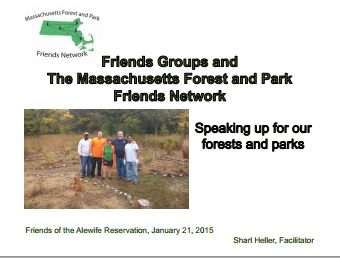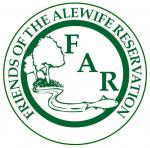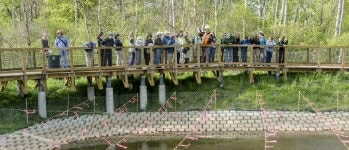From Julia, Executive Director of the Massachusetts Rivers Alliance
Disappointment on MS4 Rule by DEP and Governor Baker
At the last statewide stormwater coalition meeting, Commissioner Suuberg announced that MassDEP would follow the EPA's lead in staying implementation of the state general stormwater permit for one year.
Needless to say, this is a very disappointing decision. As the Globe pointed out in its Sunday stormwater editorial, the EPA stay of the permit, part of the Trump administration's pattern of rolling back environmental protections around the country, gave MassDEP an unusual opportunity to take the lead in championing clean water in our state. To do so, DEP had only to implement its own permit, negotiated over many long years, issued over a year ago, and now nine years overdue. (Under our system of jointly issued permits, the two agencies sign identical permits and if one is challenged or stayed, the other still stands. In this case, the EPA stayed its permit for a year, citing legal challenges. However, the DEP permit was not appealed).
Many communities covered under the permit had already begun preparing to comply with it, which requires towns to, among other things, map and understand their stormwater systems, so they understand where the water is coming from and can eliminate illicit discharges into waterways. Yesterday's DEP announcement adds to the uncertainty about what is being required of municipalities (and when), and will almost certainly slow the progress toward clean water across the state.
From Gabby, Policy Specialist at the Massachusetts Rivers Alliance
Comments Needed to EPA against Repeal of Clean Water Rule which protects our Alewife streams
As many of you already know, the U.S. Environmental Protection Agency (EPA) has been ordered by President Trump to repeal the Waters of the U.S. rule, also known as the Clean Water Rule, which defines which wetlands and waterways are protected under the Clean Water Act.
EPA has opened a 30-day public comment period on the repeal and we need your help to submit as many comments as possible telling EPA to keep the Rule intact.
To submit comments, click here to fill out a comment form before August 28th.
Some background information on the Rule and the repeal process:
In 2015, the Obama administration finalized the Clean Water Rule, which included commonsense protections for streams and wetlands across the country.
The rule was developed to clarify which streams and wetlands fall under Clean Water Act protections, a clarification that was sorely needed after years of legal battles over the issue. The Rule affirmed existing court decisions that in fact, these wetlands and streams do fall under the Clean Water Act.
These Clean Water Rule safeguards protect small streams that feed the drinking water sources for nearly 1 in 3 Americans.They also protect wetlands throughout the nation that filter pollutants from water, absorb floodwaters and provide habitat for countless wildlife.
This repeal is the beginning of a two step process. Following a successful repeal, EPA would then replace the Clean Water Rule with a set of rules that would substantially weaken federal pollution safeguards for streams and wetlands.
Suggestions for what to include in your comments:
I oppose the plan to to weaken commonsense safeguards that protect our water resources.
This repeal would eliminate protections for up to 60 percent of streams and wetlands nationwide and jeopardize the health of drinking water sources for more than 117 million Americans.
The Clean Water Rule provides protections for 20 million acres of wetlands and more than half of the stream miles across the country. These protections are essential to ensure the health of our waterways.
Clean water is essential to our health, vital to all communities, and necessary for a robust economy. We rely on these small streams for drinking water and these wetlands to protect our communities from floods.
The Clean Water Act has a very bold goal - to make all of our waters swimmable and fishable. Repealing the Clean Water Rule will make it much more difficult to achieve that goal.
Please listen to the majority of Americans who expect EPA to protect clean water, not polluter profits. I ask that you strengthen, not weaken, safeguards that protect our water.
- Home
- Directions
- FAR Wildlife Blog
- Calendar
- News
- Donate Now
- Get Social!
- Storm Water Wetlands
- Plants and Restoration
- Photos
- Videos
- About & Projects
- Master Plan for Alewife
- Archive
- Newsletters
- Contact
 Presentation Spotlighting Alewife Reservation
Presentation Spotlighting Alewife Reservation
 Follow us on Twitter
Follow us on Twitter
 Like us on Facebook
Like us on Facebook
 Follow us on Instagram
Follow us on Instagram
Forward our web address to a friend!
- An Urban Gem - Alewife Reservation Nature Preserve
- Envisioning The Silver Maple Forest
- History and Policies of Cambridge, Belmont, and DEP
- Storm Water Wetlands
- Friends of Alewife Reservation brochure
(front, back) - Technical Analysis of Upper Alewife Basin
- Watershed: An Excursion in Four Parts
- The River Is A Restless Spirit: Life in the floodplain forest
-
Assessment of Silver Maple forest for DEP Adjudicatory hearings and
Patrick Fairbairn, author of the Assessment - Community Native Garden Flora
The
Alewife Reservation
is a unique natural resource for the communities of Belmont, Arlington and Cambridge
and home to hundreds of species, including hawks, coyotes beavers, snapping turtles, wild turkeys and muskrats,
the reservation is a unique natural resource for the community.
Historical information (Powerpoint)
Friends of Alewife Reservation works to protect and restore this wild area and the surrounding area for the water quality, native plants, animals and over 90 bird species with paths for walking, running and biking, recreation, and for classroom education and research. We regularly steward and preserve the Reservation area for wildlife and for the enjoyment of present and future generations.

(video)
By-Laws
About Friends of Alewife Reservation
Statement of Purpose
Citizen Forester newsletter archive
The Birds of the Cambridge Region of Massachusetts

by William Brewster 1906
Nuttal Ornithological Society
Biodiversity Study of Alewife Reservation Area: Species, Habitat, Ecosystems

Inventories by David Brown, wildlife assessor (2003, 2004.) Published by and available from FAR for $10. Write or call for your copy. (sample)
Updated Dave Brown Inventories (2008, 2010)
Inventories of Alewife Reservation Wetland Plants by Walter Kittredge, Botanist (2013)
Email: alewife@greencambridge.org
Join our mailing list
For technical problems with this website, email: webmaster@friendsofalewifereservation.org

